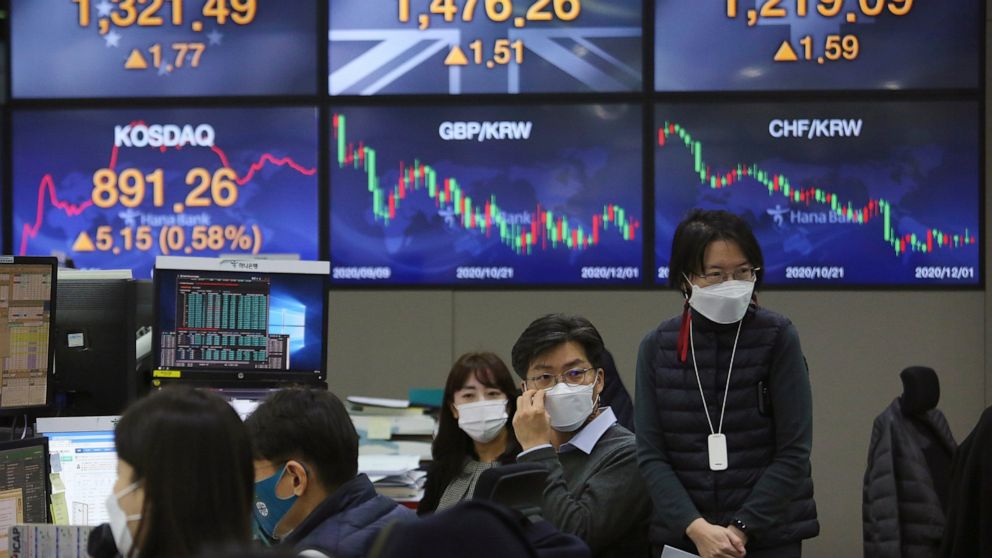Global stocks gain on stronger Asian trade, manufacturing
Global stocks are higher after Chinese manufacturing improved, South Korea reported stronger exports and Australia’s central bank left its benchmark lending rate at a record low
BEIJING — Global stocks and U.S. futures rose Tuesday after Chinese manufacturing improved, South Korea reported stronger exports and Australia’s central bank left its benchmark lending rate at a record low.
Markets in London, Frankfurt, Shanghai and Tokyo advanced as investors looked ahead to U.S. Federal Reserve Chairman Jerome Powell’s appearance before legislators a day after he said the pace of recovery is moderating.
Investors are optimistic about the development of a possible coronavirus vaccine despite caution about the short-term economic impact of rising virus cases in the United States and Europe.
The future “seems incredibly bright and bullish,” Stephen Innes of Axi said in a report.
In early trading, the FTSE 100 in London rose 0.6% to 6,304.22 and Frankfurt’s DAX added 0.7% to 13,384.06. The CAC 40 in Paris gained 0.6% to 5,551.72.
On Wall Street, futures for the S&P 500 index and Dow Jones Industrial Average were up 0.7%.
On Monday, the S&P 500 lost 0.5% but ended November up 10.8% for its best monthly performance since April. The Dow lost 0.9% and the Nasdaq composite slipped 0.1%.
In Asia, the Shanghai Composite Index gained 1.8% to 3,451.94 after an index of Chinese manufacturing activity by a business magazine, Caixin, hit a decade high in November. A separate survey Monday by the government statistics agency showed activity at a three-year high.
The Nikkei 225 in Tokyo advanced 1.3% to 26,787.54.
The Hang Seng in Hong Kong added 0.9% to 26,567.68 after the Chinese territory on Monday announced the closure of government offices and restrictions on restaurants and other businesses to stop a new spike in coronavirus infections.
The Kospi in Seoul advanced 1.7% to 2,634.25 after South Korea reported exports rose 4% in November over a year earlier, rebounding from October’s decline. That was led by a 16.4% increase for semiconductor sales.
The S&P-ASX 200 in Sydney rose 1.1% to 6,588.50 after Australia’s central bank left its benchmark lending rate unchanged at 0.1%. The bank said an economic recovery is under way but is likely to be “uneven and drawn out.”
India’s Sensex added 1% to 44,610.18. New Zealand declined while Southeast Asian markets rose.
In Washington, Powell said in a statement Monday economic prospects are “extraordinarily uncertain” after the pace of improvement moderated. He said a full recovery is unlikely until the public is confident the disease is under control.
Powell was due to appear Tuesday before the Senate Banking Committee with Treasury Secretary Steven Mnuchin. The panel oversees the $2 trillion aid package approved by Congress in March.
Investors are encouraged by the end of uncertainty about the outcome of the U.S. presidential election. They are reassured Washington could be under divided control, reducing the chances of big changes in taxes or regulation.
Markets also have been heartened by announcements from pharmaceutical companies of advances in vaccine development.
One developer, Moderna, said Monday it is ready to apply for emergency approval in the United States and Britain. Pfizer and German partner BioNTech are asking to begin vaccinations in the U.S. in December. British regulators also are assessing the Pfizer shot and another from AstraZeneca.
In energy markets, benchmark U.S. crude oil lost 12 cents to $45.21 per barrel in electronic trading on the New York Mercantile Exchange. The contract fell 19 cents to $45.34 on Monday. Brent crude, used to price international oils, sank 17 cents to $47.71 per barrel in London. It dropped 59 cents from the previous session to $47.59.
The dollar edged down to 104.31 yen from Monday’s 104.34 yen. The euro advanced to $1.1972 from $1.1946.
![]()


